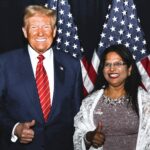The outcome of the US Elections, in this closely monitored race, carries a heightened level of uncertainty in key swing states, given how close both candidates are in early polls. This is further complicated by the uncertainty in which party will have power in Congress, with all the seats in the House of Representatives along with 33 senate seats being contested – policy decision making will be impacted irrespective of the winning party.
As a backdrop, across the US there are ongoing concerns about trade and globalization negatively impacting businesses, mistrust of China, a polarization on America’s role in foreign policy and the global stage, a divide around climate change and the pace of technology. Economic security, trade and tariffs, taxes, geo politics, foreign policy, regulations, climate, and technology all come to the forefront in this pivotal US elections with major reverberations at a global level on politics, economics and international institutions.
Some aspects to the impact of the US elections on the domestic stage, and the global implications:
Domestically, the outcomes of the elections would center around broad changes in regulatory oversight, taxation rates and democratic norms. It is no secret that one party favors deregulation and lower taxes more than the other, while potentially undermining US democratic norms. Cutting across industries from financial services to defense to energy to technology to consumer products to health care, policy and regulatory shifts around trade and tariffs, antitrust, defense spending, consumer protection, climate, technology and labor would impact industries in varied visible ways. Further, corporate tax rates could rise from the current 21 per cent if the Tax Cuts and Jobs Act is not renewed by the end of 2025.
For example, Donald Trump’s proposed blanket 10-20 per cent tariff on all imports, and upwards of 60 per cent on all goods from China would impact all industries particularly those reliant on import/export; technology, agriculture and manufacturing. Tariffs would not only disrupt supply chains, but also result in trade wars. Harris has argued that such broad-based tariffs would burden American businesses and consumers with higher costs, while Trump maintains that tariffs strengthen American industry. The question remains open whether job gains due to protection from tariffs would benefit jobs and the economy from trading partner retaliation and currency swings.
Antitrust policies would impact the M&A environment, with major implications for US business structure and strategy; policy changes in the Affordable Care Act would have repercussions on the health care sector; changes in subsidies in relation to the Inflation Reduction Act would negatively impact the growth of the renewable energy sector; changes in the support for unions and labor could be more meaningful for the automotive sector; changes in the current mandate towards climate change would see a reprioritization and pullbacks on environmental regulation; changes in technology regulation would impact the growth and innovation in tech.
Globally, as the US presidential race enters its final weeks, we recognize how much the elections matters to worldwide. The contentious and uncertain US elections outcome significantly impacts the dynamics across various countries and regions, and the various alliances and agreements they have – whether it is the European Union, China, Russia, India or the Middle East.
As the America First protectionism and strategic competition come into play – to varied degrees across either administrations – we see five major areas of potential global impact and concern: democratic norms and institutions, foreign policy and security, trade and tariffs, climate policy, and technology governance.
While the Harris administration will foster the rule of international order and the historical leadership role the US has played in it, Donald Trump’s recent statements and policies from his first administration have created concerns around authoritarianism and the international order. This could embolden and legitimize other populist-nationalist leaders and autocratic regimes across Europe, Asia and South America, and reduce support for established democratic institutions and principles in various countries.
Foreign policy and security is also a concern. In Europe this fear centers around the stability and security architecture provided by NATO and in the current context, the Russia-Ukraine war. Trump’s insistence of “budgetary burden-sharing” and possibly walking out of NATO would further strengthen the position of adversaries. The Harris administration in contrast would provide for greater support, stability, and predictability for NATO and sovereignty of member countries.
Proposals around trade and tariffs would impact global industries from technology to auto to steel with ensuing trade wars, currency shifts and supply chain dislocations. While both the Biden-Harris and Trump administrations have moved towards the use of tariffs as a protectionist and strategic competitive tool, the level of emphasis and impact would differ with Harris favoring deeper relations, communication, and alliances. Additionally, a Trump win could heighten the insistence to follow his China policies, leading to decoupling from China.
Uncertainty around the elections is also concerning for climate policy. Trump had previously threatened to withdraw from the 2015 Paris agreement and increase drilling. From the Harris administration we could see greater US and global prioritization for climate with support for increased regulation around climate change.
Technology including AI, quantum computing and cyber security is proving to be a driver of innovation, economic success and political power. Given this ambiguity, several Asian countries are building on their strengths and participating in bilateral and multilateral agreements on digital partnerships and technology governance. Technology regulation, policies and disclosures under either US administration would vary significantly while also having a major impact on the shaping of the global technology industry.
Disclaimer: The opinions and views expressed in this article/column are those of the author(s) and do not necessarily reflect the views or positions of South Asian Herald, its editorial team, or its affiliates. South Asian Herald does not endorse any opinions or statements made within the content.






